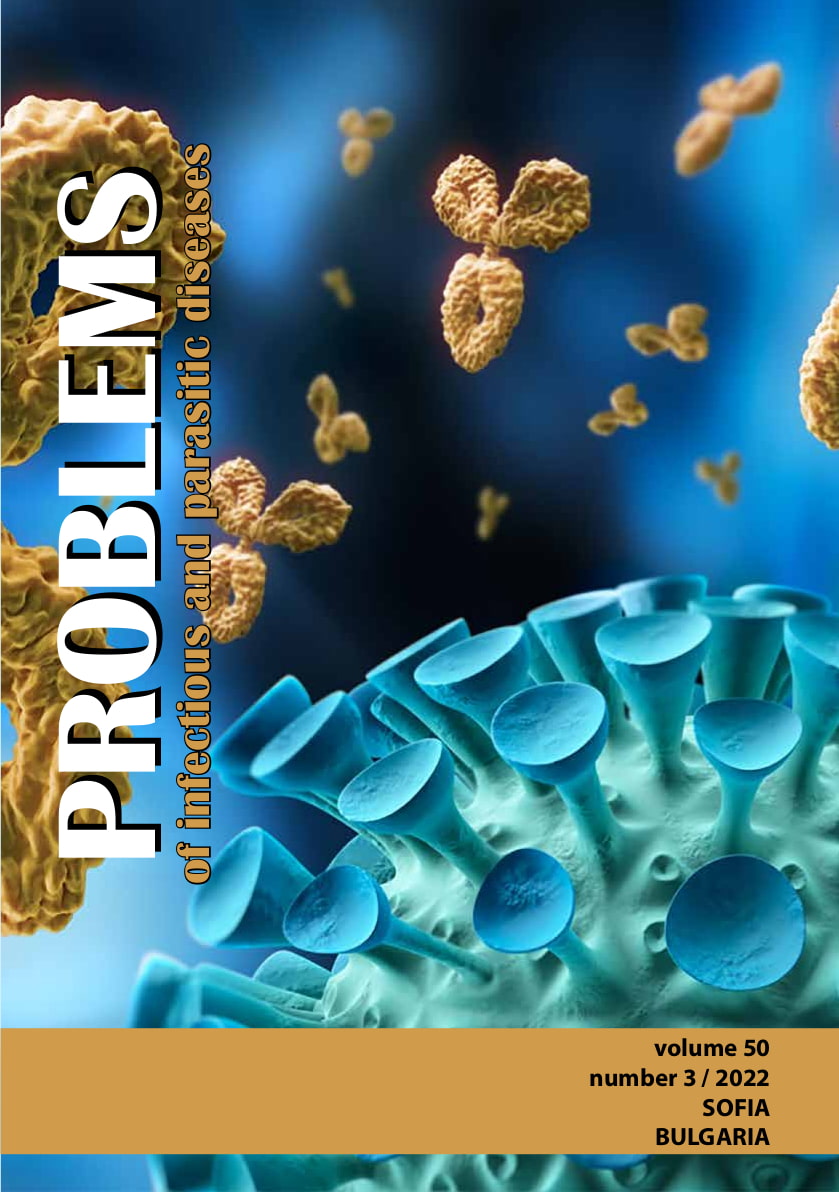ASSESSMENT OF SARS-COV-2 SPECIFIC B-CELL IMMUNE MEMORY: EVIDENCE FOR PERSISTENCE UP TO 1 YEAR POST-INFECTION
DOI:
https://doi.org/10.58395/wc1f1t22Keywords:
SARS-CoV-2, Immune memory, Humoral immunity, B-cell immunityAbstract
Background: SARS-CoV-2, the virus responsible for COVID-19 pandemic, has posed huge global health challenges. Understanding the immune response to SARS-CoV-2 infection, and in particular – the role of B cells in the generation of immune memory is crucial for assessing the durability of protective immunity.
Materials and Methods: In this longitudinal prospective study, individuals who had recovered from SARS-CoV-2 infection were included. Peripheral venous blood samples were collected at three time intervals post symptom onset (PSO): 1-3 mo, 4-8 mo, and 9-12 mo. The humoral immune response was evaluated by measuring anti-SARS-CoV-2 IgG, virus-neutralizing antibody activity, total S1-specific B-cells, and B cell subpopulations.
Results: The levels of anti-SARS-CoV-2 specific IgG antibodies decreased from 390.3 to 204.5 BAU/ml in the first 6-8 months PSO but did not significantly decrease further until the 12 th mo (126.6 BAU/ml). Virus-neutralizing antibodies (activity decreased by 20.4% between the 1st and 6-8th mos but remained relatively stable thereafter and could be detected up to 12 months PSO. In peripheral blood, the amount of S1-specific plasmablasts was highest one month after COVID-19 infection, and the level of memory B cells at 6 months. Those were detected even 12 months PSO, albeit in smaller quantities.
Conclusion: The study provides evidence for the persistence of SARS-CoV-2-specific B-cell immune memory up to 1year post-infection. The presence of virus-specific memory B cells and plasmablasts suggests potential for sustained protection against reinfection. Further research is needed to elucidate the role of B-cell immune memory in preventing infection and to understand the individual variations of immune response.
Downloads
References
Ren LL, Wang YM, Wu ZQ, et al. Identification of a novel coronavirus causing severe pneumonia in human: a descriptive study. Chin Med J (Engl) 2020;133:1015–1024. https://doi.org/10.1097/CM9.0000000000000722
Post N, Eddy D, Huntley C, et. al. Antibody response to SARS-CoV-2 infection in humans: A systematic review. PLoS One. 2020 Dec 31;15(12):e0244126. https://doi.org/10.1371/journal.pone.0244126
Zuiani A, Wesemann DR. Antibody Dynamics and Durability in Coronavirus Disease-19. Clin Lab Med. 2022 Mar;42(1) https://doi.org/10.1016/j.cll.2021.10.004
Nguyen-Contant P., Embong A. K., Kanagaiah P., et. al., S Protein-Reactive IgG and Memory B Cell Production after Human SARS-CoV-2 Infection Includes Broad Reactivity to the S2 Subunit. mBio 11, e01991-20 (2020). https://doi.org/10.1128/mBio.01991-20
He Z, Ren L, Yang J, et al. Seroprevalence and humoral immune durability of anti-SARS-CoV-2 antibodies in Wuhan, China: a longitudinal, population-level, cross-sectional study. Lancet. 2021;397:1075–1084. https://doi.org/10.1016/S0140-6736(21)00238-5
Tangye S.G., Tarlinton D.M. Memory B cells: effectors of long-lived immune responses. Eur J Immunol. 2009;39:2065–2075. https://doi.org/10.1002/eji.200939531
Stavnezer J, Guikema JE, Schrader CE. Mechanism and regulation of class switch recombination. Annu Rev Immunol. 2008;26:261-92. https://doi.org/10.1146/annurev.immunol.26.021607.090248
COVID-19 Forecasting Team. Past SARS-CoV-2 infection protection against re-infection: a systematic review and meta-analysis. Lancet. 2023 Mar 11;401(10379):833-842. https://doi.org/10.1016/S0140-6736(22)02465-5
Hartley GE, Edwards ESJ, Aui PM, et al. Rapid generation of durable B cell memory to SARS‐CoV‐2 spike and nucleocapsid proteins in COVID‐19 and convalescence. Sci Immunol. 2020;5(54):eabf8891. https://doi.org/10.1126/sciimmunol.abf8891
Thieme CJ, Abou-El-Enein M, Fritsche E, et. al Detection of SARS-CoV-2-specific memory B cells to delineate long-term COVID-19 immunity. Allergy. 2021 Aug;76(8):2595-2599. https://doi.org/10.1111/all.14827
Dan JM, Mateus J, Kato Y, et al. Immunological memory to SARS-CoV-2 assessed for up to 8 months after infection. Science. 2021;371 https://doi.org/10.1126/science.abf4063
Yao L, Wang GL, Shen Y, et. al. Persistence of Antibody and Cellular Immune Responses in Coronavirus Disease 2019 Patients Over Nine Months After Infection. J Infect Dis. 2021 Aug 16;224(4):586-594. https://doi.org/10.1093/infdis/jiab255
Garcia Valtanen P., Hope C.M., et. al. “One year later” - SARS-CoV-2-specific immunity in mild cases of COVID-19. https://doi.org/10.2139/ssrn.3859298
Rodda LB, et al. Functional SARS-CoV-2-Specific Immune Memory Persists after Mild COVID-19.!Cell. 2021;184 (1):169-183.e17. https://doi.org/10.1016/j.cell.2020.11.029
J. M. Dan et al., Immunological memory to SARS-CoV-2 assessed for up to 8 months after infection. Science 10.1126/science.abf4063 (2021). https://doi.org/10.1126/science.abf4063
Sherina N et al., SARS-CoV-2-specific memory B and T cell responses developed with time and were persistent in all of the patients followed up for 6-8 months. Med (N Y). 2021 Mar 12;2(3):281-295.e4. https://doi.org/10.1016/j.medj.2021.02.001
Balachandran H, Phetsouphanh C, Agapiou D, et. al; COSIN Study Group. Maintenance of broad neutralizing antibodies and memory B cells 1 year post-infection is predicted by SARS-CoV-2-specific CD4+ T cell responses. Cell Rep. 2022 Feb 8;38(6):110345. https://doi.org/10.1016/j.celrep.2022.110345
Björkander S, Du L, Zuo F, et. al; BAMSE COVID-19 study group. SARS-CoV-2-specific B- and T-cell immunity in a population-based study of young Swedish adults. J Allergy Clin Immunol. 2022 Jan;149(1):65-75. e8. https://doi.org/10.1016/j.jaci.2021.10.014
Downloads
Published
Issue
Section
License
Copyright (c) 2023 Martina Bozhkova, Teodora Kalfova, Steliyan Petrov, Tanya Velyanova, Hristo Taskov, Maria Nikolova, Marianna Murdjeva (Author)

This work is licensed under a Creative Commons Attribution 4.0 International License.





